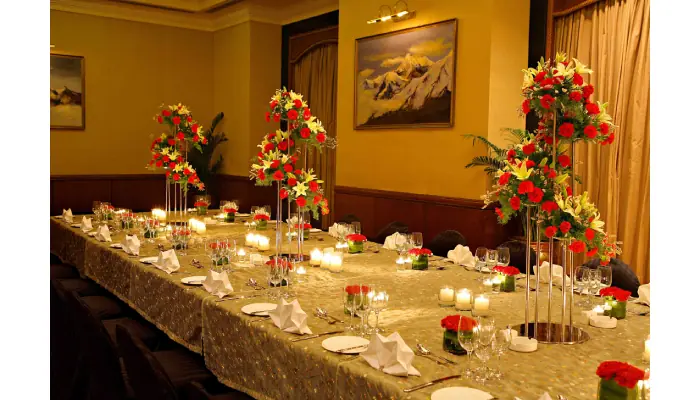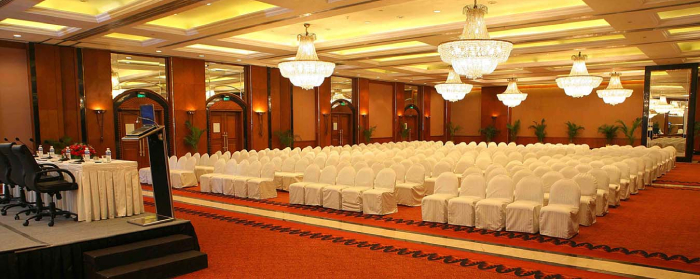
When planning business meetings, choosing the right hotel is crucial for success. Start by considering the location; being near airports and public transit can save valuable time for attendees. Look for hotels with spacious meeting rooms equipped with modern audio-visual tools and reliable Wi-Fi. It’s important to have various room types available for overnight stays, accommodating everyone’s needs, including those requiring accessible options. Make sure there are dedicated staff to help plan events and handle logistics smoothly. Plus, checking online reviews can provide insights on reputations of potential venues to ensure a productive and seamless experience for all involved.
1. Location Considerations for Business Hotels
When choosing a hotel for business meeting, location is a key factor that can significantly affect the overall experience. Proximity to airports and public transportation is essential, as it facilitates easy access for attendees arriving from various locations. For instance, hotels near major airports not only save time but also reduce travel stress, allowing participants to arrive at their meetings ready to engage.
In addition to transportation, the accessibility of local attractions and restaurants enhances the appeal of the hotel. After a long day of meetings, team members often appreciate the opportunity to unwind at nearby dining spots or explore local sights. This can also be a great way to foster team bonding or entertain clients.
Safety is another critical consideration. A hotel located in a secure area can provide peace of mind for both guests and event organizers. Researching crime rates and reading reviews about the neighborhood can help ensure that the chosen location is safe and welcoming for all attendees. Ultimately, a well-chosen location optimizes convenience, comfort, and productivity for business meetings.

2. Essential Facilities and Amenities
When choosing a hotel for business meetings, essential facilities and amenities play a crucial role in ensuring a smooth experience. First and foremost, look for meeting rooms equipped with modern audio-visual equipment, including projectors and screens, to facilitate presentations and discussions. High-speed internet access is non-negotiable; seamless Wi-Fi throughout the hotel is vital for connecting devices and supporting virtual collaboration.
A well-equipped business center can be a lifesaver, offering services like printing, copying, and administrative support. On-site dining options are also important, allowing attendees to grab a meal or coffee without needing to leave the venue, which can help maintain focus and productivity.
Furthermore, consider the overall atmosphere and design of the meeting spaces. Comfortable and well-lit environments contribute to better engagement and creativity. For example, hotels that provide flexible seating arrangements can adapt to various meeting formats, whether it’s a formal boardroom setup or a more relaxed workshop style. By prioritizing these facilities and amenities, you ensure that your business meetings are not only productive but also enjoyable.
- Conference rooms with various seating arrangements
- High-speed internet access
- Audio-visual equipment availability
- Business centers with printing and copying services
- On-site catering options
- Fitness centers and wellness services
- Parking facilities or shuttle services
- Flexible event spaces that can adapt to different group sizes
3. Room Types and Their Configurations
When selecting a hotel for business meetings, understanding the variety of room types and their configurations is essential. Hotels typically offer a range of accommodations, including single rooms, double rooms, and suites, catering to different preferences and needs. If you’re traveling with a team, consider options for block bookings to secure rooms close together, enhancing convenience. Additionally, many hotels provide accessible rooms designed for individuals with disabilities, ensuring that everyone can participate comfortably.
It’s also important to note the flexibility in room configurations. Hotels may offer various setups, such as traditional single or double rooms for individual guests or larger suites for executives needing more space. This variety allows you to choose accommodations that best suit your team’s dynamics and requirements. Whether you need spaces for one-on-one meetings or larger gatherings, understanding these options can significantly impact the overall experience.
4. Meeting Spaces: Sizes and Styles
When choosing a hotel for business meetings, the variety of meeting spaces available is crucial. Hotels typically offer rooms of different sizes to accommodate various group sizes, from intimate gatherings to larger conferences. For instance, a small team meeting might be best suited for a room with a capacity of 10-15 people, while a seminar could require a space that holds 50 or more.
Flexibility in seating arrangements is another key aspect. Many hotels provide options such as theater-style seating for presentations, classroom setups for interactive workshops, or boardroom styles for discussions. This adaptability allows you to tailor the space to fit the meeting’s objectives.
Breakout rooms are also an invaluable feature for larger meetings, allowing smaller groups to engage in focused discussions or brainstorming sessions without distractions. Having these additional spaces can enhance the overall productivity of your meetings, making it easier to manage different agendas simultaneously. This level of consideration for meeting space design can significantly impact the effectiveness of your business gatherings.
5. Services Offered by Hotels
When selecting a hotel for business meetings, the range of services offered can significantly enhance the overall experience. Many hotels provide dedicated event planning staff who can assist in coordinating logistics, ensuring that everything runs smoothly from start to finish. This support is invaluable, especially for first-time planners. Catering services are another crucial component; hotels often offer a variety of meal options, coffee breaks, and snacks tailored to your group’s needs, which can help keep energy levels high during long meetings.
Additionally, some hotels offer shuttle services, providing convenient transportation to and from the airport or other event locations. This can save time and reduce stress for attendees, allowing them to focus on the meeting ahead. These services, combined with the right facilities, can create a seamless experience that fosters productivity and engagement.
6. Technology and Equipment Needs
When choosing a hotel for business meetings, technology and equipment are vital. Look for venues that offer state-of-the-art audio-visual setups, including projectors, screens, and microphones. For meetings that involve remote participants, ensure the hotel has teleconferencing capabilities. This allows seamless interaction between in-house attendees and those connecting from afar.
Moreover, reliable on-site IT support can save the day if any technical hiccups arise. Having a dedicated team ready to assist can provide peace of mind, letting you focus on your agenda rather than troubleshooting issues.
Some hotels even offer advanced features like interactive whiteboards or video conferencing suites. For example, if you plan to host a large presentation, a venue with a large screen and high-quality sound can make a big difference in engagement and effectiveness. Always verify that the technology aligns with your specific needs before making a booking.
7. Flexibility in Policies and Options
When planning business meetings, flexibility in hotel policies can be a game-changer. Look for hotels that offer adaptable cancellation and rescheduling policies. This is crucial, as business plans often shift unexpectedly. For instance, if a key participant is unable to attend, a hotel that allows easy changes without hefty fees can save your budget and peace of mind.
Additionally, consider hotels that provide options for hybrid meetings. With the rise of remote work, having the capability to combine in-person and virtual attendance can enhance participation and engagement. This means that even if some team members cannot make it to the venue, they can still join the meeting seamlessly.
Corporate clients should also inquire about special packages that might include discounts or added benefits, such as complimentary breakfast or upgraded meeting spaces. These perks not only improve the overall experience but can also contribute to significant cost savings.
8. Checking Reputation and Reviews
Before booking a hotel for your business meeting, it’s crucial to check its reputation and reviews. Online platforms like TripAdvisor and Google offer insights from past guests, helping you gauge the overall experience. Look for consistent feedback regarding service quality, cleanliness, and the professionalism of staff. Recommendations from peers in your industry can also guide your choice. Additionally, consider any awards or recognitions the hotel may have received, as these accolades often reflect a commitment to excellence. For example, a hotel frequently recognized for its business services might provide the reliability and support you need for a successful meeting.
9. Understanding Cost Considerations
When planning a business meeting, understanding costs is essential. Start by budgeting for accommodation, meeting spaces, and any additional services you might need. It’s important to look beyond the advertised rates and consider the full pricing structure. Hidden fees, such as resort fees or gratuities, can add up quickly, so ask for a detailed breakdown. For example, a hotel might seem affordable at first glance, but those extra costs can significantly impact your budget.
Exploring loyalty programs or corporate discounts can also help manage expenses. Many hotels offer special rates for businesses that book frequently, which can lead to substantial savings over time. Additionally, consider the value of services included in the price. A hotel that provides complimentary breakfast or free Wi-Fi might save you money in other areas.